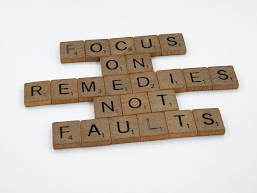8 Ways to Be a Better Parent
How to Look After Your Child
Be a Better Parent
1. Stay away from Comparisons and Labels
You need to
be the sort of parent who carves out opportunity to ingrain in your youngster
great habits, propensities, and conduct. Be that as it may, how? What's more,
with controlled disorder managing the day, each day, when? Unwind: Good
nurturing occurs continuously, on the spot, and at the time. The stunt is
perceiving those minutes when your activities and responses can help your kid
learn and fill in the most ideal ways. Here's help from top nurturing
specialists and a couple of genuine mothers.
Your dearest
companion's 8-month-old child is jabbering, while your little girl, at 9
months, is quiet by correlation. Is there a major issue with your kid? While
it's never a poorly conceived notion to communicate your interests to your
pediatrician, don't compare formative achievements with formative cutoff times.
"Infants grow so quickly that one bunch of capacities will undoubtedly
grow quicker than another," says Harvey Karp, MD, creator of The Happiest
Toddler on the Block (Bantam), likewise accessible on DVD. "Check your
entire child" while assessing improvement, he proposes, a procedure that
remains constant for babies as well: one 3-year-old might have fine-engine
control abilities, taking care of a pastel with finesse, for example, while another
may toss a ball better-and that is ordinary out.
Considering
the entire little individual means figuring in personality as well. "It's
essential to consider who your youngster is, in addition to his age. For
example, assuming your kid is normally timid and calm, it is possible that he's
not leaned to talk-not that he can't," Dr. Karp says. "Pay attention
to him at play when he's distant from everyone else. He might jibber jabber
joyfully then, at that point."
Among kin,
examinations can prompt marks. "Our little researcher," you could say
of your book-fixated baby, or "our crazy kid," of his vivacious
sister. Indeed, even marks intended to applaud your youngsters' varying
capacities can be hazardous. Kin some of the time feel that if one sibling
"claims" the competitor name, the other sibling isn't in any event,
going to attempt, inspired by a paranoid fear of missing the mark. What's more,
that "finicky eater" name might fuel the very conduct you might want
to deter. Indeed, there'll be times when you'll end up portraying your kid's
preferences. Yet, when you do as such, "rethink" your words, Dr. Karp
proposes: attempt "lively" (not "wild"),
"energetic" (not "hyper"), and "cautious" (not
"timid").
2. Walk the Talk
Kids keep a
close eye on you, and, particularly for infants and extremely little
youngsters, parental way of behaving ends up being undeniably more remarkable
than words. "You are really showing your child something all day long
regardless of whether you plan to pass along an illustration," says Elizabeth
Pantley, creator of The No-Cry Discipline Solution: Gentle Ways to Encourage
Good Behavior Without Whining, Tantrums and Tears (McGraw-Hill). "From how
you handle pressure to how you praise accomplishment to how you welcome a
neighbor in the city, your child is noticing you and figuring out how to answer
in different circumstances."
Julie
Hughes, of Wilton, Connecticut, was contacted when she noticed her girl Amelia,
who was 23 months at that point, affectionately mothering her doll, after the
introduction of Amelia's sister, Jane. "I observed Amelia with a cushion
on her lap and her child doll laid across it, claiming to nurture her,"
reviews Hughes, who was feeling much better that Amelia was finding out about
focusing on others even without Hughes-who was occupied with three younger than
4-deliberately instructing that example. "Simply having your child with
you as you go during your time gives extraordinary chances to show him
life," Pantley says.
3. Allow Your Child To commit Errors
Your kid is
building a pinnacle, and you see that the square he's going to put on top will
make it come crashing down. Restless to keep away from the accident (and
following tears), you prevent him from adding the square, making sense of that
occasionally "one more is an excessive amount." While you're on the
right track to forestall mishaps that could truly hurt, permitting your kid to
gain from his mistakes imparts the current example better than a clarification
at any point could, says Christopher Lucas, MD, an academic partner of
youngster and juvenile psychiatry at the New York University School of
Medicine, in New York City.
At an
exceptionally essential level, this sort of error assists a youngster with
getting circumstances and logical results. But on the other hand it's all the
more sincerely beneficial to allow your youngster to encounter dissatisfaction
at times particularly as a brought down block tower-as opposed to safeguarding
him from all adverse occasions, Dr. Lucas adds.
Essentially,
when your child is dominating how to utilize a sippy cup or your baby is
figuring out how to dress himself, specialists like Dr. Lucas urge guardians to
allow mix-ups to occur. Lillian Valentine Hope, mother of 18-month-old Lauren,
recollects her girl's first endeavors to drink water from a cup. "The
initial time, she began choking a bit. My first motivation was to frenzy and
snatch it from her," says Hope, who lives in Brookfield, Connecticut.
"Yet, I decided rather to say 'It's OK' and 'We should attempt it once
more!' After a couple of rounds of experimentation and splashed shirts, she was
effective." Dr. Lucas says there's valid justification for this:
"Youngsters learn best on the edge of disappointment that is in the same
place as the test and where there's the most chance for development."
4. Sit idle
Truth be
told, let your children be exhausted, says therapist Michael Gurian, creator of
Nurture the Nature: Understanding and Supporting Your Child's Unique Core
Personality (Jossey-Bass). "Their personalities arise when they are just
let potentially run wild. They get a pencil and draw or go out in the patio.
They understand their own fantasies and contemplations. The movement will be
independent and will cultivate self-bearing," says Gurian, who adds that
this remains constant for even youthful babies despite the fact that they will
require both management and a little help, particularly assuming they will
quite often fight and squabble when they're their own. Set out apparatuses and
toys to entice them: craftsmanship supplies or a major cardboard box for making
a house, for example.
Mother of
two Nina Becker, of Glen Cove, New York, portrays the free for all of action
encompassing the homecoming of her more youthful child, Kevin, whom the Beckers
embraced at year and a half. "At first we were going around with huge
loads of exercises," expresses Becker of her endeavors to adjust Kevin to
each part of his new climate. "However at that point it appeared to be
both young men weren't content with different children around. I dropped all
playdates. I quit planning, so we could all have some good times together
according to our very own preferences."
Two or three
contemplations for impromptu, at-home time: TVs and PCs ought to be forbidden.
However, assuming your youngster proposes you play a game together, by all
means say OK. "That is kid coordinated family time, and that is
magnificent," Gurian says. The main concern: Strive for a harmony between
arranged exercises and personal time, and everybody children and guardians the
same will be most joyful.
5. Reexamine Your Use of Food to
Comfort or Praise
Indeed, even
the most youthful child will begin to liken solace with consuming assuming the
jug is generally proposed to calm crying. So will the little child who is
routinely given squeezed apple after a fall or a treat for good way of
behaving, says Dr. Karp, who adds that what a youngster looks for and what is
essential to offer is your consideration, straightforward as can be.
"Indeed,
even exceptionally little youngsters are wired for social relations," Dr.
Karp makes sense of. For their purposes, parental consideration is about more
than just "getting enough"- it implies everything on the planet to
them. Your appending a treat to the arrangement adjusts that insight. "You're
exhibiting that an item or sweet has more legitimacy and worth than does a
basic embrace and a grin," says Dr. Karp, permitting that an intermittent
bowing of this standard is to be excused. "Of course, take out the serious
weapons when you truly need them. Your kid has a fit of rage in the
supermarket? Definitely, offer her a treat. Also, it will truly work then,
since you haven't abused it."
6. Look Behind "Awful"
Behavior
Eventually
your kid will defy each norm you make. Be that as it may, assuming you respond
to every infraction with a similar demonstration of dissatisfaction Mommy's
frantic; he's in the break seat he may not arrive at a comprehension of what
provoked the standard breaking conduct in any case.
7. Pay attention to Your Instinct
Your expectations
are great. With an end goal to pursue the best decisions for your kid, you set
out to find out about how to force the perfect rest plan, stick to the fitting
measure of TV seeing, and align the best wholesome equilibrium of protein,
fats, and carbs. Attempting to get everything right can be debilitating, and
you're at times tormented with culpability that you haven't satisfied these
principles. Sound natural? Truly, there are a ton of specialists out there-and
decidedly a lot of exhortation, some of it clashing. "Nobody understands
your kid better compared to you do," says Gurian, who urges guardians to
trust their own senses.
For
instance, do you detect naturally that a child music class will be challenging
for your 10-month-old child, who cries when compelled to stand by for even
brief periods? Then skip it. Likewise the perusing status programming program
that while cherished by the neighbor's kid is certainly not a hit with your
own. "Your kid may not appreciate guidance at 3 years old. She might get
disappointed and switched off. Your stomach might be letting you know that
she'd get more out of accomplishing something different with her time: playing,
for instance," says Gurian, who urges guardians to stay away from the
snare of choosing an excessive amount of too early out of a nervousness that
their youngsters will "fall behind." And, uplifting news: There's an
advantage for you, as well, in adopting this strategy. "At the point when
guardians recover command over the dynamic interaction, they feel freed,"
Gurian adds. "They knew what to do; it was in their stomach some
place."
8. Be Ready to Embrace Change
A child who
once adored a movement currently dismisses it. Guardians can rush to accept
that something's off-base when, as a matter of fact, it is possible that he's
developed. While estimating your kid's outward indications of development in
inches and on the scale, recollect that he is making progress within
too-sincerely and intellectually. The guardians' job as their youngsters advance
from newborn children to babies and then some? To develop right alongside them.
Basically,
your youngster's "rowdiness" is an immediate consequence of the way
that he have zero control over his feelings and it is one of guardians' most
significant assignments to show their kids how to do exactly that. "Your
youngster doesn't cry and have hissy fits since he is attempting to control
you. He isn't intentionally being 'terrible,'" says Pantley, who calls
feeling powered eruptions with respect to extremely small kids "naturally,
mentally, and totally typical."
So while you
might well force the suitable disciplinary measure (that opportunity, for
example), a quiet and empathetic discussion is significant as well. Ask your
youngster inquiries, and give ideas, Pantley recommends: "Your sister is
crying since you took her bear. What will cheer her up? How about you assist
her hold on for giving her an embrace?"













.jpeg)
.jpeg)


.jpeg)
0 Comments